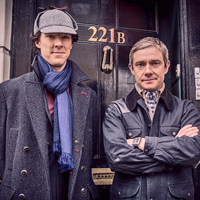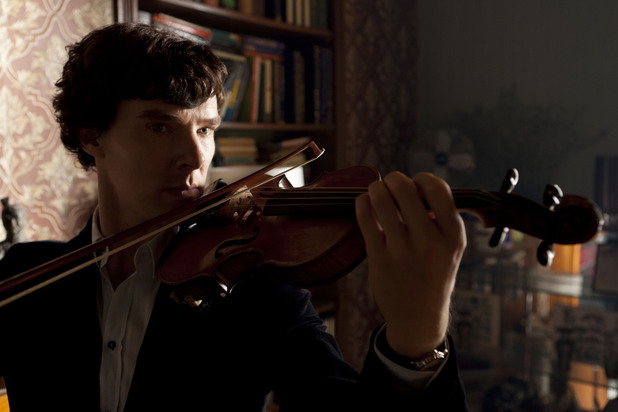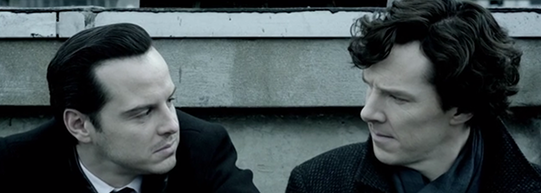
BBC Sherlock Fan Forum - Serving Sherlockians since February 2012.
- TheHat
- Wrong!
 Offline
Offline 
- From: Indiana USA
- Registered: June 10, 2015
- Posts: 1
How to ruin a show
Season 3, Episode 1, The Empty Hearse:"
Two things no video should ever use: 1) a voiceover explaining the plot, like the first release of "Blade Runner."Harrison Ford raised Hell about having a voiceover, but was forced to do it. 2) a character taking time at the end to explain what you just watched. If the script and video presented doesn't explain the plot than you've failed the audience.
I loved this show until this episode and that's after falling in love with the first two seasons. Use some better film values people, stop making cheap video dumbed down as though we need it.
How We Are Savid
"At dawn the orange light returns to the mountains
The small birds cry out and bear it up.
-W.S.Merwin
- SusiGo
- The game is never over (moderator)
 Offline
Offline 
- From: Germany
- Registered: June 5, 2012
- Posts: 22,969
Re: How to ruin a show
Hello and welcome. Maybe you would like to introduce yourself and explain a little better what you mean.
I do not like films using voice-over very much but in this episode it is just used in the video. Moreoever, it has been a technique throughout the show to have Sherlock explain his methods supported by flashbacks or on-screen titles. What is so different about this one?
------------------------------
"To fake the death of one sibling may be regarded as a misfortune; to fake the death of both looks like carelessness." Oscar Wilde about Mycroft Holmes
"It is what it is says love." (Erich Fried)
“Enjoy the journey of life and not just the endgame. I’m also a great believer in treating others as you would like to be treated.” (Benedict Cumberbatch)

- Kittyhawk
- Mycroft's Contact
 Offline
Offline - From: France
- Registered: April 5, 2015
- Posts: 451
Re: How to ruin a show
Hi, TheHat and welcome to the forum.
Would you mind elaborating on your post (to me it sounds like something you just heard in film school or English class or a similar setting)?
I mean, I could write several pages on all the things that are horribly wrong with this episode (from Sherlock's "What life?" to the bomb's off-switch and probably every second - at least - scene in between) - and you focus on the voiceover? Frankly, without checking I don't even know what exactly you are talking about... I suppose that proves that I wasn't bothered by it...
- Harriet
- Most Human Human Being
 Offline
Offline 
- From: 110A Piccadilly
- Registered: August 24, 2012
- Posts: 9,887
Re: How to ruin a show
I think this voice-over technique is a masterfully used stylistic device to let us know there is something fishy about the explanation. It was done very intentionally by people who know how to write.
Last edited by Harriet (June 10, 2015 3:05 pm)
Eventually everyone will support Johnlock. Independent OSAJ Affiliate
... but there may be some new players now. It’s okay. The East Wind takes us all in the end.
- Ah-chie
- British Government
 Offline
Offline 
- Registered: December 17, 2014
- Posts: 757
Re: How to ruin a show
I tend to think of the voice overs in TEH along the lines of those used in the masterpiece "Rashomon" (1950) so to me it is a very effective use of that particular tool in storytelling.
There are many examples of effective use of voice overs in cinema which are used to enhance the story not lessen the impact of the visuals. Those voice overs in The Empty Hearse do just that - they push the story along in an orderly manner and add to the visuals, not take away from them IMO.
I liked TEH very much and disagree entirely that it wasn't an excellent episode. Others may disagree with my stand - that's OK, opinions (and that's all these are - opinions, not facts chiseled onto tablets) vary... ![]()
-Val
"The only shipping I know is shipping containers."
-Benedict Cumberbatch
- tonnaree
- The "B" is SILENT! (Mod)
 Offline
Offline 
- From: Atlanta, Georgia, USA
- Registered: May 31, 2013
- Posts: 9,270
Re: How to ruin a show
Ah-chie wrote:
I tend to think of the voice overs in TEH along the lines of those used in the masterpiece "Rashomon" (1950) so to me it is a very effective use of that particular tool in storytelling.
There are many examples of effective use of voice overs in cinema which are used to enhance the story not lessen the impact of the visuals. Those voice overs in The Empty Hearse do just that - they push the story along in an orderly manner and add to the visuals, not take away from them IMO.
I liked TEH very much and disagree entirely that it wasn't an excellent episode. Others may disagree with my stand - that's OK, opinions (and that's all these are - opinions, not facts chiseled onto tablets) vary...
-Val
Well, I agree with you archie.
----------------------------------------------------------------------
Proud President and Founder of the OSAJ.
Honorary German
"Anyone who takes himself too seriously always runs the risk of looking ridiculous; anyone who can consistently laugh at himself does not".
-Vaclav Havel
"Life is full of wonder, Love is never wrong." Melissa Ethridge
I ship it harder than Mrs. Hudson.


- Ivy
- High Functioning Sociopath
 Offline
Offline 
- From: Berlin, Germany
- Registered: July 31, 2012
- Posts: 2,330
Re: How to ruin a show
What a debut!![]()
- Vhanja
- One More Miracle
 Offline
Offline 
- From: Sandnes, Norway
- Registered: December 11, 2014
- Posts: 6,607
Re: How to ruin a show
I love TEH, it's one of my favorite episodes. I can't at the top of my head remember any voice over, though.
Edit: Oh, you mean when Sherlock explains the fall? I thought that was an awesome way to do it.
Last edited by Vhanja (June 10, 2015 6:54 pm)
__________________________________________________________________________________________________________________________________________
"We'll live on starlight and crime scenes" - wordstrings

Team Hudders!
- Yitzock
- Stayin' Alive
 Offline
Offline 
- From: Canada
- Registered: May 5, 2015
- Posts: 3,887
Re: How to ruin a show
Ah-chie wrote:
I tend to think of the voice overs in TEH along the lines of those used in the masterpiece "Rashomon" (1950) so to me it is a very effective use of that particular tool in storytelling.
There are many examples of effective use of voice overs in cinema which are used to enhance the story not lessen the impact of the visuals. Those voice overs in The Empty Hearse do just that - they push the story along in an orderly manner and add to the visuals, not take away from them IMO.
I liked TEH very much and disagree entirely that it wasn't an excellent episode. Others may disagree with my stand - that's OK, opinions (and that's all these are - opinions, not facts chiseled onto tablets) vary...
-Val
I agree with this, since it's part of him telling the story, and because it's not the first time something like this has happeed.
I hadn't thought of the comparison to Rashomon, but now that you' mention it is kind of like that.
I think it's much better with the voiceover as well, (not that there's anything wrong with not thinking that) because it gives not only what happened, but why, as well as Sherlock's own word, which are important since this obivously has to do with Sherlock's character and something he did that made a big impact (pardon the expression) on himself and others (probably negatively as well as positively, I don't doubt that it hurt Sherlock to deceive John and others, even if he knew it was for the best). I like the "everything else was window dressing" line, and the comparison to a clock for example.
But again, I have nothing wrong with you not thinking this, and welcome!


Clueing for looks.
- Vhanja
- One More Miracle
 Offline
Offline 
- From: Sandnes, Norway
- Registered: December 11, 2014
- Posts: 6,607
Re: How to ruin a show
I found it similar to other "voice overs" in the show, where Sherlock's deductions are shown over freeze-framed moments of what he sees where. That was done from the very first episode.
__________________________________________________________________________________________________________________________________________
"We'll live on starlight and crime scenes" - wordstrings

Team Hudders!
- SusiGo
- The game is never over (moderator)
 Offline
Offline 
- From: Germany
- Registered: June 5, 2012
- Posts: 22,969
Re: How to ruin a show
Harriet wrote:
I think this voice-over technique is a masterfully used stylistic device to let us know there is something fishy about the explanation. It was done very intentionally by people who know how to write.
True, it is well done, so well that I did not categorise it as voice-over at all.
------------------------------
"To fake the death of one sibling may be regarded as a misfortune; to fake the death of both looks like carelessness." Oscar Wilde about Mycroft Holmes
"It is what it is says love." (Erich Fried)
“Enjoy the journey of life and not just the endgame. I’m also a great believer in treating others as you would like to be treated.” (Benedict Cumberbatch)

- SolarSystem
- Threatened Knighthood
 Offline
Offline - From: Germany
- Registered: July 30, 2013
- Posts: 10,650
Re: How to ruin a show
Well, it did register as a classic voice over with me, and more often than not I do have problems with voice overs because they tend to get used as an easy way out when writers/directors don't know how else to show or tell certain things. In most Film Noirs they work perfectly, but apart from that... difficult.
In TEH though I think it's used in exactly the right way. It's perfect because it's totally subjective. Sherlock tells us what happened at the end of TRF, it's from his POV, it's his story, and the voice over makes this absolutely clear... and it's left to the audience to decide whether or not he's telling the truth.
Last edited by SolarSystem (June 10, 2015 9:34 pm)
___________________________________________________
"Am I the current King of England?
"I see no shame in having an unhealthy obsession with something." - David Tennant
"We did observe." - David Tennant in "Richard II"
- jenosborn
- British Government
 Offline
Offline - From: San Francisco
- Registered: March 7, 2012
- Posts: 696
Re: How to ruin a show
Harriet wrote:
I think this voice-over technique is a masterfully used stylistic device to let us know there is something fishy about the explanation. It was done very intentionally by people who know how to write.
Thank you Harriet. Correct.
- Schmiezi
- Reichenbach Survivor
 Offline
Offline 
- From: NRW, Germany
- Registered: August 10, 2012
- Posts: 5,478
Re: How to ruin a show
jenosborn wrote:
Harriet wrote:
I think this voice-over technique is a masterfully used stylistic device to let us know there is something fishy about the explanation. It was done very intentionally by people who know how to write.
Thank you Harriet. Correct.
I agree with you. Thanks for pointing it out, Harriet.
---------------------------------------------------------------------------------------------------------------------------------------------------------------------------------
I still believe that love conquers all!


"Quick, man, if you love me."
- REReader
- Mycroft's Contact
 Offline
Offline 
- Registered: July 29, 2014
- Posts: 519
Re: How to ruin a show
Ah-chie wrote:
I tend to think of the voice overs in TEH along the lines of those used in the masterpiece "Rashomon" (1950) so to me it is a very effective use of that particular tool in storytelling.
There are many examples of effective use of voice overs in cinema which are used to enhance the story not lessen the impact of the visuals. Those voice overs in The Empty Hearse do just that - they push the story along in an orderly manner and add to the visuals, not take away from them IMO.
I liked TEH very much and disagree entirely that it wasn't an excellent episode. Others may disagree with my stand - that's OK, opinions (and that's all these are - opinions, not facts chiseled onto tablets) vary...
-Val
I'm of this mind myself.
I'd add that there are no flat out good or bad techniques in filmmaking, it all depends on how, when, and why different techniques are used.
Last edited by REReader (June 11, 2015 1:44 pm)
____________________
"Oh, you meant 'spectacularly ignorant' in a NICE way."
- Ah-chie
- British Government
 Offline
Offline 
- Registered: December 17, 2014
- Posts: 757
Re: How to ruin a show
Nice to hear from you REReader.
Definitely voice overs and narration can enhance the storytelling of a film as can any technique used properly.
IMO, TEH is one such example, but there are hundreds of illustrations of effective use of voice over/narration in films over many decades (too many to be listed here).
I pulled Rashomon out as a comparative to TEH because it used this technique sparingly but to great effect and like TEH it was utilised to present a particular POV of a character.
Far from being a weakness of the episode I actually would argue that it is a specific strength of it and gives us a unique way of seeing things through Sherlock's eyes when compared to other characters viewpoints.
It certainly doesn't "ruin" the show for me. Far from it. TEH was a well-written story which brought a lot of in-depth character study (growth to the two protagonists) to the fore front, introduced a new element to the show's dynamic (Mary) to keep it from being a repeat of past themes and was a great way to set up the course for the upcoming plots for the rest of Season 3.
-Val
"The only shipping I know is shipping containers."
-Benedict Cumberbatch
- Sherlock Holmes
- Administrator
 Offline
Offline 
- From: 221B Baker Street
- Registered: February 7, 2012
- Posts: 5,162
Re: How to ruin a show
TEH makes me cringe at how awful I find it at times. It's my least favourite episode of the whole series.
The voiceovers didn't bother me though. Just the plot and the editing techniques.
I do agree with your second point though, about re-telling the audience something they've just watched. That's definitely a bad writing technique, although I can't remember where they actually DID that in TEH.
---------------------------------------------------------------------------------------------------------------------------------------------
Eventually everyone will support Johnlock.
Independent OSAJ Affiliate

- tonnaree
- The "B" is SILENT! (Mod)
 Offline
Offline 
- From: Atlanta, Georgia, USA
- Registered: May 31, 2013
- Posts: 9,270
Re: How to ruin a show
I know that I'm in the minority but I liked the voice over in the original Bladerunner. I loved the movie as a whole. Voice over's don't bother me in general. Maybe I have just been lucky and not seen a lot of BAD movies that have voice overs.
----------------------------------------------------------------------
Proud President and Founder of the OSAJ.
Honorary German
"Anyone who takes himself too seriously always runs the risk of looking ridiculous; anyone who can consistently laugh at himself does not".
-Vaclav Havel
"Life is full of wonder, Love is never wrong." Melissa Ethridge
I ship it harder than Mrs. Hudson.


- Liberty
- Moderator
 Offline
Offline 
- Registered: June 29, 2014
- Posts: 5,992
Re: How to ruin a show
I was just thinking, Tonnaree, that I must watch the original Bladerunner again because I don't remember the voiceover being quite as bad as everybody says. I've only watched it without the voiceover in recent years, so I can't really remember. But I grew up watching film noir and actually like voiceovers, if they're used well. I think they can add a certain feel/tone, and sometimes even a heads-up that you're being shown a very personal viewpoint, one which might not be 100% objective fact. Is it really bad to have voiceover in Sunset Boulevard, for instance? Or Fight Club?
- Davina
- Moderator
 Offline
Offline 
- From: The Only Way is Essex UK
- Registered: February 9, 2012
- Posts: 9,714
Re: How to ruin a show
Couple of comments: this is also my least favourite episode (nowt to do with the voiceover though), Bladerunner is better without the voiceover UNLESS you see Bladerunner to be following the tradition of a film noir in which case it is just a different slant, many times voiceovers are used lazily but used well- especially in film noir etc.- then they can be extremely effective (anyone seen Fortitude with the final voiceover? Stunning!)
![]()
---------------------------------------------------------------------------------------------------------------------------------------------
Don't make people into heroes John. Heroes don't exist and if they did I wouldn't be one of them.


 1 of 1
1 of 1